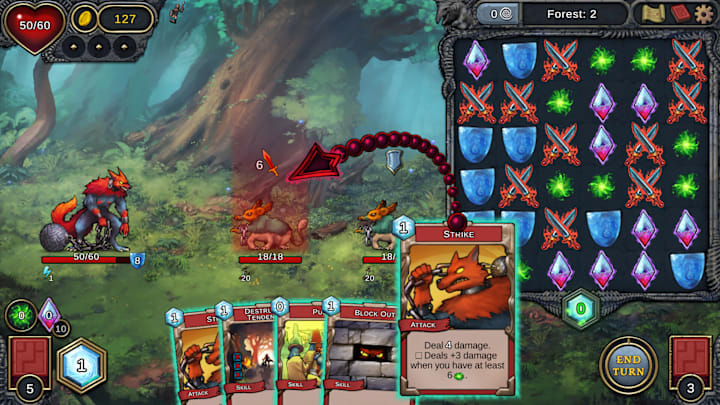Demon’s Mirror review: an excellent roguelike deckbuilder with a match-three twist

Wait, hold on, I know, it’s easy to balk at a game the moment you see a match-three board on the screen, but it’s ok, Demon’s Mirror isn’t some trashy mobile game or cheap knock-off. It’s a roguelike deck-builder, heavily inspired by Slay the Spire – as most modern indie deck-builders are, but still: wait – but this one throws Puzzle Quest-style chain mechanics on top of it to create a surprisingly intelligent gameplay loop.
The setup for each battle will be familiar if you’ve played one of these games before. You have a hand of cards and limited energy to play them. You can use them to deal damage, defend yourself, inflict status conditions, or even manipulate the pieces of the chain board, which is Demon’s Mirror’s unique addition.
You see, instead of playing a card, you can create a chain out of one of the four symbols to achieve similar effects. There’s no upper limit to the lengths of these chains, and each tile included equals one point of whatever it is, meaning that if you set the board upright (and get a little lucky) you can deal much more damage with a long chain than any of your cards ever could.
While both the cards and the board can attack or defend, each section has things only they can do. For example, only cards can inflict status conditions or give yourself buffs, while the board has two resources that can’t be gained any other way – essence, which powers up certain cards, and willpower, which charges your character’s special abilities.
The two sides have a symbiotic relationship. Cards can manipulate the board by changing, moving, or deleting tiles, while the essence you can gather from the board charges up your cards. It means you’re never thinking about either one in isolation, you always need to consider both before you make a move, as the order you do so can dramatically affect how well you do.
It pushes you into a unique kind of thinking. Instead of just focusing on your hand of cards and working out the best synergies, you need to consider the interplay of two entirely different gameplay styles that are seamlessly woven together. When you see a screenshot of the cards with the board for the first time, it looks a bit jarring, but it quickly becomes second nature to analyze both simultaneously to work out clever strategies.
The game always allows you to use both, too. By default, making a chain costs two of your three starting energy on a turn, but the three characters’ starting abilities all lower this cost in some way. The starting character, for example, makes your first chain free on every turn, meaning you only have to consider the heavy cost of chaining if you want to use it a second time.
A system like that is necessary as the board isn’t just some safe haven for you to accrue buffs, as enemies can cast hostile tiles onto it that will explode for huge damage in a few turns unless you disarm them by including them in chains. If anything, it makes play focus more on the board than on the cards, which are more reliable but, on average, less powerful.
As I progressed, I found it was more effective to purge all but the most powerful attack and defense cards from my deck, focusing instead on buffs, debuffs, and board manipulation so that I could create huge chains every turn and decimate enemies in just a few moves. A strategy that is encouraged by the fact that both of the unlockable characters favor tactics that don’t focus on offensive cards.
The fact that the board is such a heavy factor means that, even though you can alter it, there is a greater degree of luck involved than in a typical deck-builder. I wouldn’t say I ever lost a run to bad luck, but there have been times when I got a terrible board, didn’t draw any cards to change it, and was stuck having to take a bad turn, which didn’t feel good. However, there is the fallback system of scrolls to help avoid this, which are one-use items you can find or buy along the way, giving you simple buffs to health and shields, or making sweeping changes to the board, such as converting all shields into swords.
It makes Demon’s Mirror a harmony of interlocking systems that all shine brightest when you’re forced to bounce between each one to make the most efficient turn. The cards may be more simplistic than Slay the Spire, but that’s only because having the board involved adds so much innate complexity. If you try to always have a game like this on hand to kill some time, then Demon’s Mirror is a great addition to your rotation, offering you something familiar while bringing ideas to the table that no one else in the genre has.
Score: 8/10
Version tested: PC (Steam)
